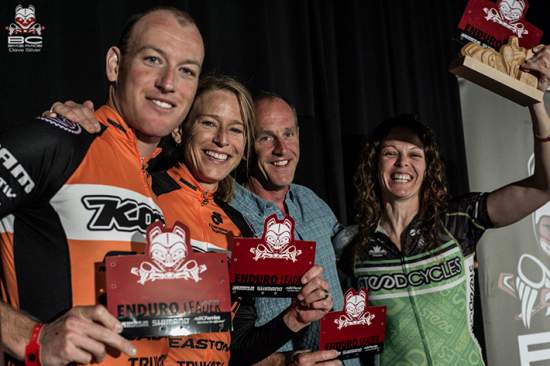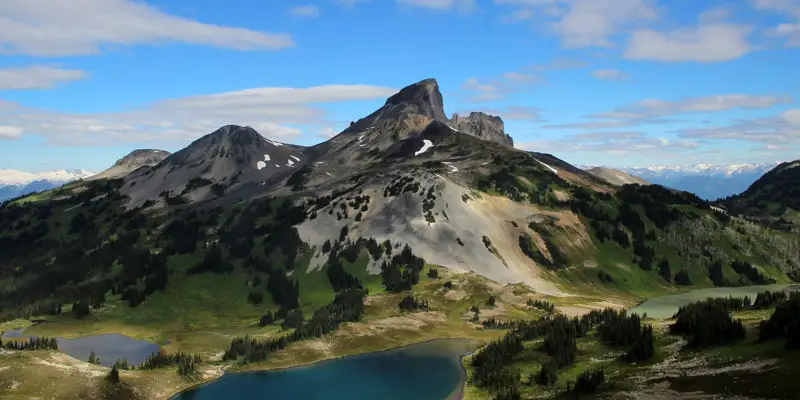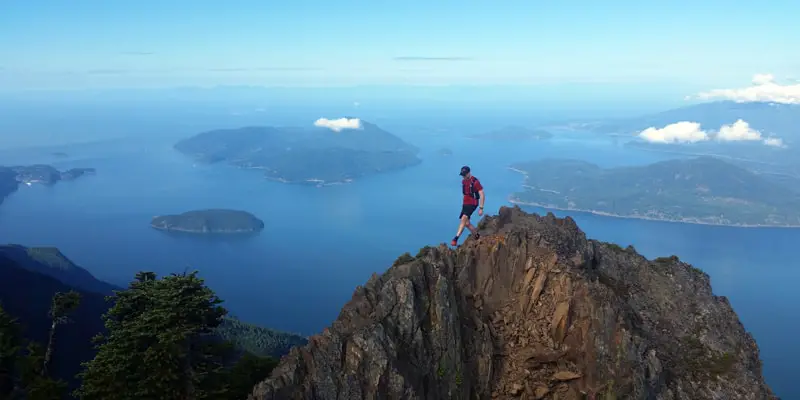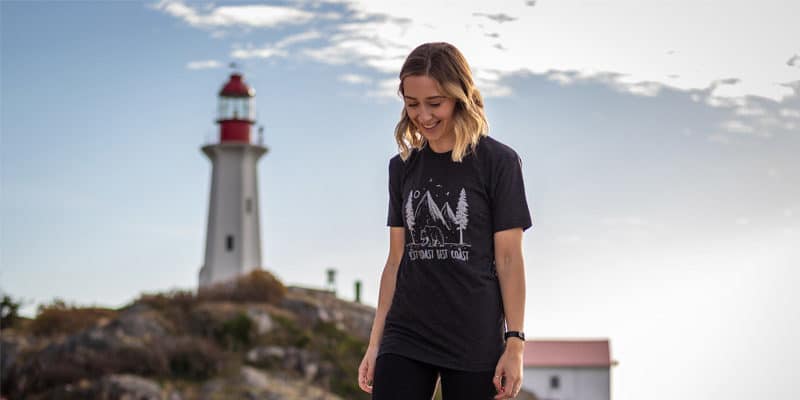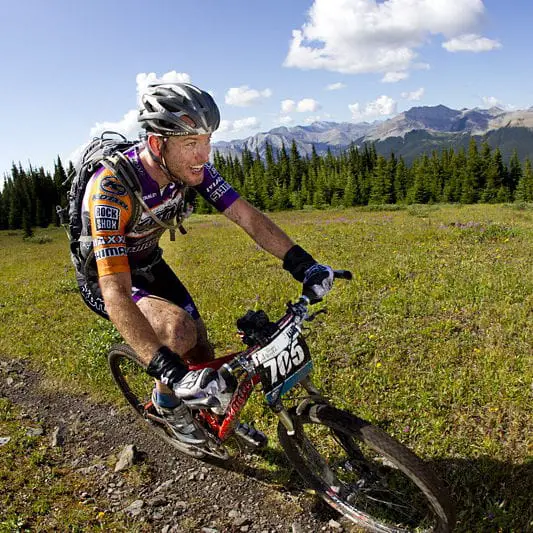 Kris at the Transrockies Challenge
Kris at the Transrockies Challenge
Tales from the Outdoors is an ongoing interview series featuring some of the most inspiring and motivational local athletes. Covering a myriad of outdoor pursuits across all skill levels, these are the stories of Vancouver’s finest adventurers. To see previous interviews in the series, click here.
Kris Sneddon, 31, has grown up and spent most of his life mountain biking in Sechelt. Kris has also spent 6 years training in Victoria with other elite riders, as well as doing races around North America and some on the European circuit, competing at the top level of his sport.
Kris, who rides for the Kona factory team, recently won the 2013 BC Bike Race’s Open Men and Enduro divisions, in his fifth appearance at the race. Heading into the final stages of the race, Kris was in a head-to-head battle for first with Squamish’s Neal Kindree, before Neal had to unfortunately pull out with a stomach bug. About the win, Kris told Pique: “It feels good (to win), but it really sucks that Neal wasn’t able to finish and that he had to pull out,” he said. “He was riding really strong. I would have liked to beat him, of course, but beat him when he’s fully good and healthy. I’m happy though, it’s been a long time since I’ve won anything and it was time to get a win.”
The BC Bike Race (BCBR) is an epic, 7 day stage mountain bike race covering over 200km of gnarly B.C. trail. The race starts in Cumberland and finishes in Whistler, with additional stages in Campbell River, Powell River, Earls Cove, Sechelt, Langdale and Squamish.
To get an idea of what the race is about, you can watch the following, uh, entertaining video recap of the 2013 event.
Following his recent win at the 2013 BCBR I was able to ask Kris a few questions about the race, his background, and his plans for the near future:
Q: How did you get started mountain biking and evolve to be competitive at a high level?
A: I was born in Sechelt and I’ve spent my whole life here, other than a stint in my mid twenties living in Victoria for 6 years because the national cycling training program is over there and there are a bunch of guys riding bikes. Other than that I started bike riding when I was in grade 5 in the Sprockids program, which originated from the Sunshine Coast. And I’ve sort of ended up travelling all over the world now, but that’s how I got started.
For the size of the town there’s a good mountain biking culture in Sechelt, but its not huge by any means. It’s really good for cross country but there isn’t as much North Shore style of bike riding. When I was here Ruedi Schnyder and Cymbol and Seth Wells were six to ten years older than me, and they were riding mountain bikes pretty seriously across BC. They went across Canada a little bit and did a couple stints in the States, so I had some guys to look up to.
In my early twenties I lived over in Victoria and just rode with everyone – that’s when Roland Green, Alison Sydor, Geoff Kabush, Andrew Pinfold, Ryder Hesjedal – like everybody was over in Victoria. Max Plaxton, Andreas Hestler, Seamus McGrath… A lot of guys that have been retired, a lot of past Olympians, but there was a massive crew of cyclists in Victoria.
Q: What is the BC Bike Race like? What makes it unique?
A: BC Bike Race is tough because there is so much single track versus other races. [Other races] are probably a little more fitness oriented. BC Bike Race is still fitness, but its more of a full body fitness than just more of road cycling fitness where its about how fast you can go up a climb and how long you can ride your bike for at threshold. For BC Bike Race you have to have some upper body strength and be able to not get tired on rough descents. You’re dealing with a lot of arm pump and trying to hold on to the handle bars. It’s a little more like a downhill race in some ways, you have the same sort of fatigue. If you’ve ever ridden the bike park in Whistler – I consider myself a great bike rider and after about 3 minutes of descending on a downhill bike I feel like I almost need to stop and take a break. And its totally crazy because you think ‘I’ll just descend from top to bottom no problem’. And BC Bike Race does have some sections like that. Like coming off Forbidden Plateau on Day 1 most people are pretty wrecked from the descent by the time they get to the bottom. Let alone the climb up there [laughs].
Q: Do you have a favorite stage at BCBR?
A: In Sechelt I have an advantage because I’ve worked on a lot of the trails we use. But I don’t know if its my favorite stage. Cumberland is pretty darn nice. Campbell River is pretty tough, and I like those two stages. Whistler and Squamish are always good. Its always nice riding in Sechelt, but its my hometown too, so I’d say Cumberland or Campbell River are my favorite [stages]. Powell River has the nicest campsite and all-around setup as far a location and everything. It’s pretty cool when you’re starting on the water in the middle of downtown of a small community. Then ride off into the trails and finish on a beach basically.
Q: You mentioned you do some trail building? What is that process like?
A: Not as much as I’d like to, because I’ve just been trying to train and focus on bike riding this year. But in the past I’ve built a fair amount of trails. I think I’ve only ever worked on one legal trail, and the rest are technically illegal. I think that’s quite common across BC, tons of illegal trails. Vancouver might be a little different around the North Shore, but up here you can still just go and build trails and no one really cares. Which is pretty cool, because the town has benefited immensely from it. Having all this recreation that was basically made for free and anybody can go and use it. Some trails take.. forever [to build]. I have one that I started probably in grade 8, and I just finished it 3 years ago.
Maintaining the infrastructure becomes a bigger challenge than actually building new infrastructure. And that’s actually a positive benefits of BC Bike Race. Its sort of like if you have people coming over to your house you might clean it up. A whole pile of trail maintenance gets done because of BC Bike Race. Its sort of like the excuse maybe to get out and say ‘Okay lets get this stuff fixed up and in good shape’. Unlike the interior, out here things grow in so immensely and trails can be open in the fall and by the end of the spring they’re grown in. You’re getting cut up going through it and you have to cut it back out. That clearing and cutting out happens in the last month/ weeks leading up to BC Bike Race.
Q: What do you have planned for the rest of 2013 and into 2014?
A: The rest of this year I have Canadian XC Nationals (Olympic distance) on July 20. The following week on the 27th I’m going to start the Transrockies – a 7 day stage race that starts in Fernie and ends in Canmore. And the route is to-be-dermined because of the flooding!
After that I have the Canada Cup at Crankworx which is another Olympic distance race. And then after that the are the Canadian Mountain Bike Marathon Nationals which are in Quebec. I’m pretty booked into September.
Q: Is there anything else you’d like to add?
A: Thanks to all the volunteers that make the BC Bike Race possible. I don’t think people realize how much of a feat it is to make all the ferries and get everything organized on time. They have everything – shower trucks and campsites – at the finish. And they have it all set up the next day in the next town by they time toy get there.
BC Bike Race, I think, is the only race that if someone hurt themselves and you stop to help them, [race organizers] give you that time back. I think that’s a pretty cool thing and that’s something that mountain biking, at least on the endurance racing side of it, should pursue. That sort of sums up the vibe of it. It’s about having a good time and going through some cool areas in coastal BC.
Congrats Kris for your win at the BC Bike Race, and best of luck with the upcoming races!
You can follow Kris on his blog.

